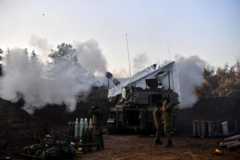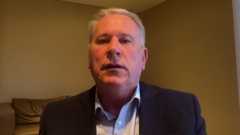The Hamas-run health ministry in Gaza says 50 Palestinians have been killed in Israeli strikes on Thursday. Fighting is continuing across the territory, with the Israeli military saying its troops are in Daraj and Tuffah neighbourhoods of Gaza City
- The Palestine Red Crescent says 10 people have been killed in a strike near al-Amal hospital in Khan Younis, which it runs
- An Israeli minister says the military will act to remove armed group Hezbollah from the border between Israel and Lebanon if attacks continue
- The UN has warned that the human-rights situation in the occupied West Bank is rapidly deteriorating and has called for Israel to "end unlawful killings" of Palestinians
- At least 1,200 people were killed when Hamas militants attacked Israel on 7 October and about 240 others were taken hostage
- The Hamas-run health ministry in Gaza says over 21,100 people have been killed in Gaza since Israel started its retaliatory campaign.
Gaza's health ministry says at least 50 people have been killed and dozens more wounded following Israeli bombardment of Beit Lahia (in the north of Gaza), Khan Younis (in the south) and Maghazi refugee camp (in the centre of Gaza) this morning.
The Hamas-affiliated Safa news agency reports that several people were killed in a strike on a house in Maghazi and four homes were destroyed in a residential block in Beit Lahia.
It's reported that shelling in an area around al-Amal hospital in Khan Younis has also left several dead.
There’s been increased cross-border fighting between Israel and the Lebanese armed group Hezbollah since the Hamas attacks on 7 October.
But rocket fire and the use of weaponised drones by Hezbollah has escalated further this week, and Israel has responded.
An Israeli war cabinet minister, Benny Gantz, warned that if the world and the Lebanese government didn’t act to stop the attacks, then the Israel Defense Forces (IDF) would take matters into its own hands.
In Gaza, as IDF troops have pushed into the central urban refugee camps and continue to target Hamas in Khan Younis in the south, tens of thousands of people have been fleeing.
With a lack of shelters in crowded Deir al-Balah and Rafah, many new arrivals there are sleeping rough or in tents on the streets.
A former British Army colonel describes the fire directed at Israel from the border with Lebanon as “intense”.
Speaking to BBC News, Colonel Richard Kemp - who is also a trustee of UK Friends of the Association for the Wellbeing of Israel’s Soldiers - says: “It’s a problem with an estimated 150,000 rockets pointing at Israel by Hezbollah in Lebanon, and tens of thousands of highly trained fighters who fought on the side of Assad in Syria in some cases.
“They are going to have to be dealt with at some point. This is basically a bit like Hamas in Gaza, it’s a gun to Israel's head.”
Kemp adds that diplomatic efforts by the US and France were ongoing to try to avoid a major conflict in the area.
Cross-border exchanges of fire have been escalating since Hamas's 7 October attacks on Israel.
At least four civilians and nine soldiers are known to have been killed on the Israeli side of the border since October.
More than 100 people have been killed in Lebanon, most of them Hezbollah fighters but civilians, including three journalists have also been killed.
THIS AND MANY MORE UPDATES AT: Israel-Gaza war latest: Israel expands central and south Gaza offensive - BBC News


No comments:
Post a Comment